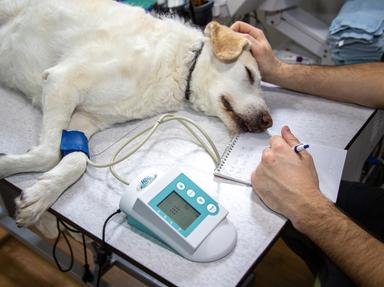Quiz Answer Key and Fun Facts
1. The Nova Scotia duck tolling retriever suffers from a hormonal malady unknown in other breeds. What is it?
2. Cyclic neutropenia, an immunodeficiency that leads to repeated infections and bleeding, is found only in a certain color of dog. Which one?
3. There are many genetic eye disorders in dogs. Which of the following is found primarily in the German shorthaired pointer?
4. Irish setters can suffer from a fatal immunodeficiency disease found only in this breed. What is it called?
5. Briards suffer from a type of blindness found only in their breed. What is it?
6. Fucosidosis, found only in the English springer spaniel, is an example of what type of disease?
7. Basset hounds can suffer from a disorder called basset hound thrombopathia. What does this disorder do?
8. Miniature schnauzers can suffer from a disorder called sick sinus syndrome. What body system does this disorder affect?
9. Progressive retinal atrophy is perhaps the most common genetic cause of blindness in dogs. In most breeds, PRA is inherited as an autosomal recessive trait. In which of the following breeds is PRA inherited as a X-linked recessive?
10. Irish setters suffer from a disease that is similar to celiac disease in humans. What is this disorder called?
11. As carnivores, most dogs tolerate cholesterol in their diet much better than humans do. However, one breed often has a genetic disorder that interferes with cholesterol metabolism. Which breed?
12. Labrador retrievers between 3 and 6 months of age which demonstrate stunted growth, weakness, a bunny-hopping gait and muscle atrophy may have what disorder?
13. Myotonia, a disorder that affects the ability of muscles to relax, is seen in what breed?
14. Beagle pain syndrome is a type of what disorder?
15. Collies can suffer from bullous pemphigoid; an immune system disorder. Which of the following is NOT true about this disorder?
16. Brittanies can have a condition called complement deficiency. What are affected dogs lacking?
17. In the 70s and 80s, David Vetter lived for 12 years in a plastic bubble that kept germs from him. His condition, severe combined immunodeficiency (SCID), is also seen in Arabian horses and what breed of dog?
18. Familial Shar-Pei fever (FSF) is an autosomal recessive disorder. Which of the following is NOT a symptom?
19. In Dalmatian bronzing syndrome, what does "bronzing" refer to?
20. Lethal acrodermatitis in the bull terrier is related to metabolism of what mineral?
Source: Author
crisw
This quiz was reviewed by our editing team before going online.
Any errors found in FunTrivia content are routinely corrected through our feedback system.
